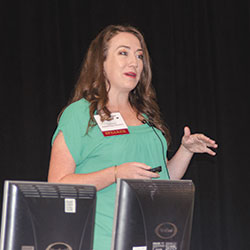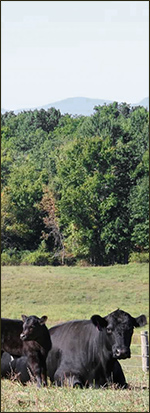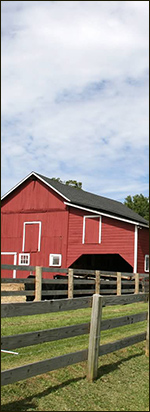Mutations and Available Selection Tools
There are several tools available to manage genetic conditions.
ALBANY, N.Y. (Aug. 27, 2013) — “Mutation is a necessary and vital thing in order for species to be able to thrive and survive over generations and centuries and millenia. It’s very important,” said Tonya Amen, genetic services director for Angus Genetics Inc. (AGI), during a special briefing preceding the 2013 National Angus Conference & Tour in Albany, N.Y., Aug. 28-30.

Every animal and human is a carrier of multiple genetic conditions within their genome, Tony Amen said, but most of them are recessive, so they are never expressed. A mutation is simply a change in genetic material. Mutations are important because they create new raw material for evolution and are the source of genetic variation.
Every animal and human is a carrier of multiple genetic conditions within their genome, she said, but most of them are recessive, so they are never expressed. A mutation is simply a change in genetic material. Mutations are important because they create new raw material for evolution and are the source of genetic variation.
There are many selection tools that can help manage these mutations, especially recessive conditions. DNA tests can identify genetic conditions in simply inherited traits, and expected progeny differences (EPDs) and DNA trait tests are useful for performance traits. As a reminder, she emphasized, EPDs can compare expected progeny performance within a breed, but they do not predict actual performance. In other words, they can’t predict whether calves out of a certain bull will weigh 75 pounds (lb.) when born, only that Bull A's calves, on average, are expected to weigh 5 lb. more than Bull B's calves.
Dollar value indexes ($Vaues) can also serve as selection tools. EPDs measure the outputs of your operation, but indexes take outputs and inputs into consideration. They are hard to develop, but easy to implement, and they analyze multiple traits along with their economic impact. $Values are expressed in dollars and cents.
Amen suggested that breeders really evaluate the end point of their operation before placing too much emphasis on a certain index. The weaned calf value index ($W) looks at the factors of getting a calf weaned. This would be useful to cattlemen who don’t retain ownership in the feedyard, but instead sell their cattle at weaning. The beef value index ($B) looks at postweaning traits. Both feedlot ($F) and grid ($G) values contribute to $B. Amen said if a breeder retains ownership in the feedyard, $B is certainly a useful index for selection. For more detailed descriptions of EPDs and $Values, visit www.angus.org/Performance/Default.aspx.
Angus breeders have two options for genomically enhanced EPDs (GE-EPDs), and both options are high-density. The Zoetis HD50K and Geenseek Genomic Profiler (GGP) are both $75 and offer parentage verification. They differ in that Zoetis HD50K offers GeneMax™ (GMX) Sire Match, and has a calving ease direct (CED) correlation of 0.61. The Geneseek test offers discounts on genetic condition tests and has a CED correlation of 0.34.
Coming in December, a second recalibration to increase accuracy will be released to coincide with publication of the next Sire Evaluation Report, she added. For a description of how genomic information is incorporated into Angus EPDs, visit www.angus.org/AGI/GenomicEnhancedEPDsMay2013.pdf.
The last selection tool Amen described, GMX, was developed for commercial producers to use in selecting for marbling and postweaning gain. The test is provided through Certified Angus Beef LLC (CAB) and Zoetis, she noted. This helps with selection of replacement heifers and feeder cattle by providing a score for gain and marbling. For additional information on GMX, visit www.cabpartners.com/genemax/index.php.
Editor’s Note: This article was written by staff or under contract for the Angus Journal®, formally known as Angus Productions Inc. (API). It may not be reprinted without the express permission of API. If you would like to reprint or repost this article, request permission by contacting the editor at 816-383-5200; 3201 Frederick Ave., Saint Joseph, MO 64506. API claims copyright to this website as presented. We welcome educational venues and cattlemen to link to this site as a service to their audience.




